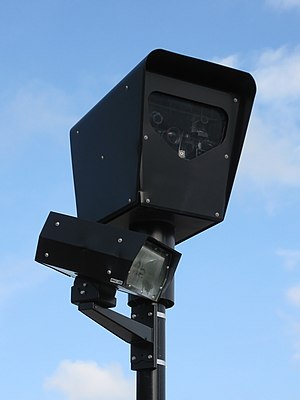
Image via Wikipedia
Basically, what these scammers do is harass consumers over fraudulent unpaid red light camera tickets. Notices come in the mail as well as through phone calls. However, these scammers go the extra mile to swindle victims because they are also presenting themselves as the police.
The documented cases so far are all similar - a victim answers his or her phone only to be told that they've got a past due red light camera ticket pending and that the only way to avoid a hefty fine increase, prosecution, or jail is to pay it immediately over the phone. Scammers take it even further to say that if victims don't pay right then and there, a warrant for their arrest will be issued.
Additionally, these traffic cop impersonators ask for credit card information, the billing address, the card's security code, date of birth, and Social Security numbers.
There is no police agency in the U.S. that conducts business in this manner - none of them even call offenders on the phone to collect on past due tickets. At times, private collection agencies may be used, but most correspondence is done officially in writing. To top it off, the police wouldn't have to ask for any sort of private information like your address - they're the police, after all and would have the photographic evidence of your license plate from the camera.
Apparently, the red light camera scam has its roots in Texas, but because traffic cameras are prevalent throughout the entire country, chances are good it will spread quite quickly. It's just like many other scams where they frighten victims into providing certain information to avoid getting into more trouble.
The best way to protect yourself from the red light scam, jury duty scam, and others like it, is to never provide any type of personal or financial information over the phone when prompted. Get as much information from the caller as you can such as their phone number, name, account number, and so forth - but do not divulge any of your personal info when prompted. Never provide personal information when it is being solicited --whether by phone, email, text or snail mail.
Anyone who thinks that they may have fallen for this scam should contact their credit card company immediately. You can also place free fraud alerts on your credit report by contacting one of the three credit bureaus. If, however, you also ended up divulging your Social Security number to the impostor, you will need to take additional steps to protect yourself from the more intrusive types of fraud that are not credit related.
It's important to be alert to today's reported scams, know and understand how your information can be used, and aware of what resources are available to help protect you from fraud. Whether your personal information is used to commit other crimes, clean out your bank accounts, file false tax returns, steal your home equity or obtain government or medical benefits, the crime can affect you for years to come.


 NEWSLETTER SIGN UP
NEWSLETTER SIGN UP SUBSCRIBE
SUBSCRIBE CONTACT
CONTACT

















Leave a comment